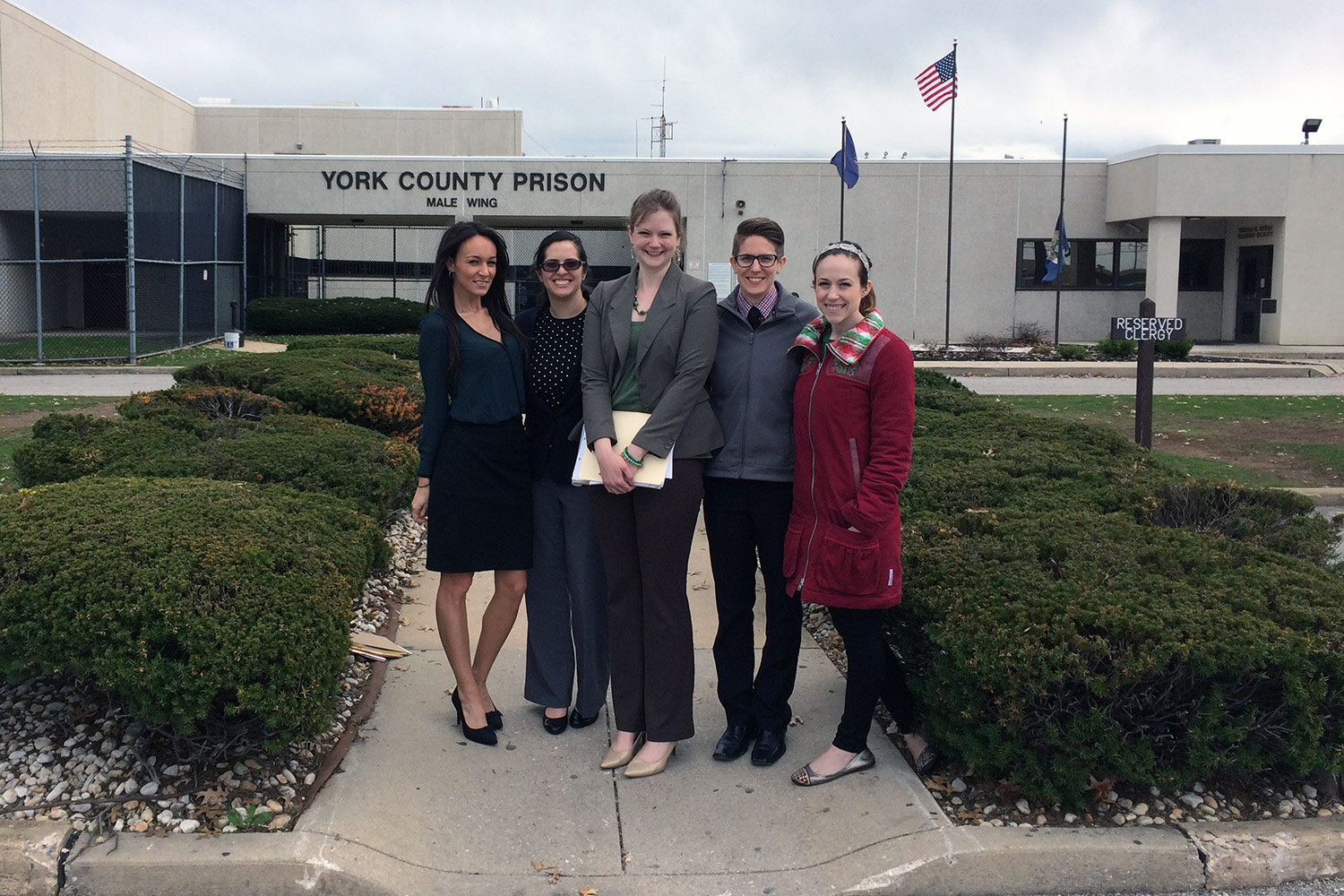Ten UConn Law students spent spring break interviewing immigrant detainees behind the walls of the York County Prison in Pennsylvania and working late into the night to help prepare their asylum applications.
The students joined forces with two law professors, two social work professors, a social work student and two law school alumnae. Together they helped compile asylum applications and supporting documentation for eight people — four Central American women who fled dire situations of domestic abuse or death threats from gangs and four men from the horn of Africa and the Caribbean who have been persecuted for their political views, ethnicity or sexual orientation.
“It was exhausting and a lot of work, and it was the most meaningful experience I’ve had in law school, even though I try to do a lot of service work,” said law student Jane Kelleher ’16, who worked on a team helping two men from Africa.
“The students did a phenomenal job,” said Anna Cabot, a teaching fellow at the law school’s Asylum and Human Rights Clinic. “I know it was difficult for many of them, as it’s difficult for most attorneys, to work with people who have suffered extreme trauma or to work with people who are detained, but to a person they handled themselves with professionalism and compassion and produced great work.”
Law student Joyce Lee ’18 said she didn’t hesitate for a second to sign up when she read the email Cabot sent looking for volunteers. Born and raised in South Korea, she has had enough of the suspicion and indignities routinely faced by immigrants. “This was my opportunity to stand up against something that was unjust,” she said.
Inside the prison’s immigration detention center, “everything is a struggle,” Lee said. “Everyone is just trying to survive. Everyone looks tired – the detainees, even the guards.” She found it difficult to adjust to that atmosphere and surprisingly difficult to readjust on her return to UConn Law, where life feels safe, comfortable and almost too distant from what she experienced.
“For the students, this was a wonderful opportunity to put their legal skills to use to make a real difference in people’s lives,” said UConn Law Professor Jon Bauer, director of the clinic. “It also opened their eyes to the human cost of our country’s current immigration detention policies. “
The students, professors and volunteers spent two or three hours each day in the prison’s immigration detention center, interviewing clients. In a conference room provided by the CGA Law Firm in York and in the Quality Inn where they were staying, they worked on affidavits laying out the asylum seekers’ narratives, produced documentation about conditions in the person’s home country and compiled indexes to describe the evidence and applicable law.
The detainees will have to represent themselves at a merits hearing in front of an immigration judge at a courtroom in the detention center, but the materials produced by the UConn team will improve their chances of proving their cases. Detained asylum seekers with legal representation are granted asylum at six times the rate of those without, but the even then the rate is still low – fewer than one in five are allowed to stay in the United States.
In addition to Kelleher and Lee, the law students who participated are Katelyn Donovan, Ben Haldeman, Miriam Hasbun, Adrianna Michalska, Bianca Slota, Hannah Tenison, Dinora Vazquez and Dvora Walker. The student of social work is Martha Cutt, the professors of social work are Megan Berthold and Kathy Libal and the law alumnae volunteers are Ellen Messali and Meghann LaFountain. Working with the alumnae was a privilege, Lee said. “I learned that there are many very cool lawyers and law professors,” she said. “It definitely changed my perception of how lawyers in real life are.”
The interdisciplinary collaboration between the UConn schools of Social work and Law was extremely beneficial to the project, Cabot said. “The social work student and professors provided mental health evaluations of some of the asylum seekers, which will be submitted to the judge as evidence. They also provided the legal participants with invaluable training on how to work with people who have suffered trauma and how to manage the effects of that work on our own mental health,” she said.
Funding for the service project came from the Tulisano Human Rights Endowment, the UConn Human Rights Institute, and private donations. The Pennsylvania Immigrant Resource Center and CGA Law Firm provided essential help in planning and arranging the trip.



